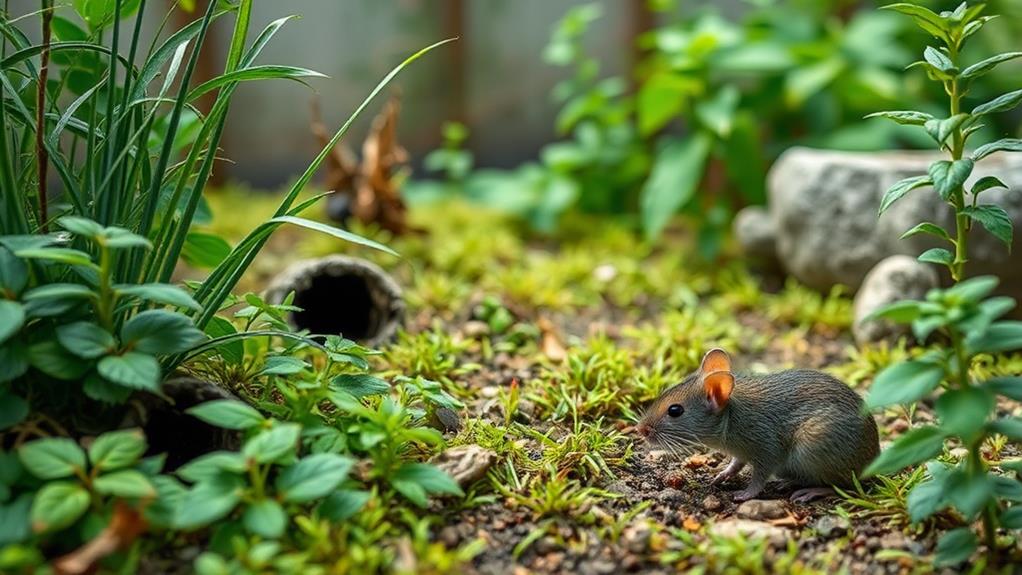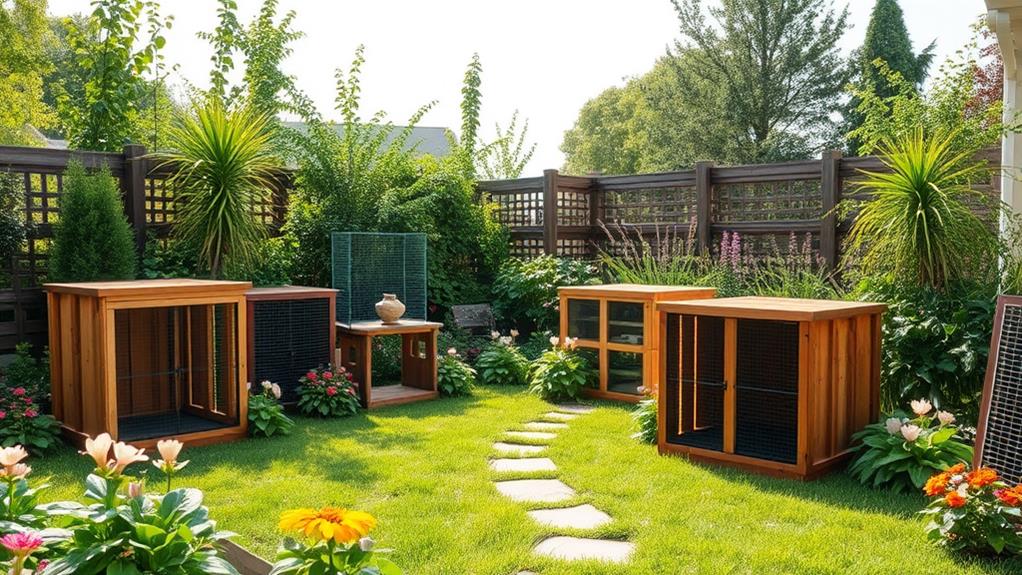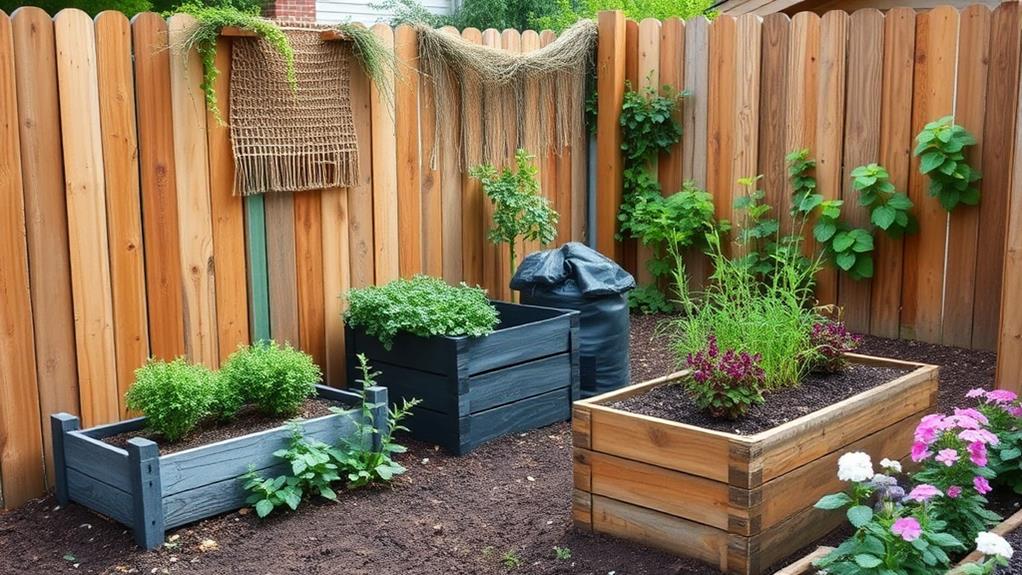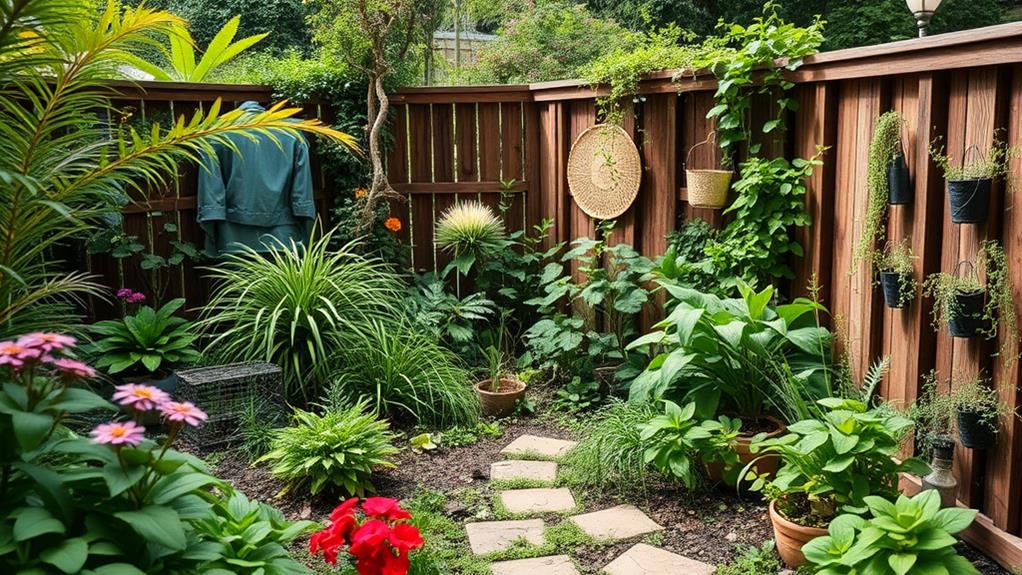If you've noticed unwanted visitors in your garden, it's crucial to understand how to manage them effectively without resorting to harsh chemicals. You can create a sanctuary that not only repels rats but also enhances your gardening experience with natural methods. From utilizing strong-smelling herbs to constructing simple barriers, there are various strategies you can implement. What you might not realize is that these methods can blend seamlessly into your garden's ecosystem, promoting a healthier environment. The next steps might surprise you, especially when you consider the surprising benefits of certain plants and DIY traps.
Understanding Rat Behavior

Understanding rat behavior is essential for effective pest control in your garden. Rats are clever little creatures, often more intelligent than you might think. They're curious and social, usually living in groups.
When you're trying to keep them out of your garden, it's vital to know what attracts them. They love food, especially seeds and fruits, so if you've got a garden full of tasty treats, you might as well roll out the welcome mat!
Rats are also nocturnal, meaning they're most active at night. If you hear rustling sounds after dark, it could be your furry friends exploring. They thrive in cozy spots, so check for hidden nooks or piles of debris where they might be nesting.
Did you know they can squeeze through tiny gaps? That's why sealing any openings around your garden is a smart move.
Lastly, remember that rats are creatures of habit. Once they find a reliable food source, they'll keep coming back. So, if you spot one scurrying away, it's a sign to take action.
Keep your garden clean and tidy, and you'll be well on your way to discouraging these little pests!
Natural Deterrents for Rats
If you're looking to keep rats at bay in your garden, natural deterrents can be a game changer. You don't need to resort to harsh chemicals; Mother Nature's got your back!
Start by using strong-smelling herbs. Plants like mint, sage, and rosemary not only smell great to us but can really annoy rats. Plant these around the edges of your garden, and you might just notice fewer furry intruders.
Another handy trick is using essential oils. Peppermint oil is especially effective. Soak cotton balls in it and place them in areas where you've spotted rats. They'll get the hint and skedaddle!
You can also sprinkle cayenne pepper or black pepper around your plants. Rats aren't fans of spicy stuff, and they'll think twice before visiting your garden.
Lastly, consider using a natural predator's scent. If you can find some cat litter or even a few feathers from a bird of prey, scattering those around can send rats running for cover. Just think of it as your garden's version of a "no entry" sign.
With these natural deterrents, you'll create a cozy haven for your plants, minus the pesky rodents!
Homemade Traps and Barriers

When pests threaten your garden, homemade traps and barriers can be your best defense. You don't need fancy gadgets or chemicals to keep those pesky critters away.
Start with simple barriers like fences made from chicken wire or mesh. This keeps rats from burrowing into your prized plants. Just make certain to bury the bottom a few inches underground; otherwise, they'll dig right under it!
You can also create traps using common household items. For a quick DIY trap, take a bucket and fill it with a little water. Then, add some bait like peanut butter on a small board that leads to the bucket's edge. When the rat tries to grab the treat, they'll fall in—oops!
But remember, check your traps regularly to guarantee no unwanted guests are stuck.
Another fun idea is to use empty soda bottles. Cut a small entry hole, place it in your garden, and watch as rats get curious but can't escape!
These homemade solutions aren't just easy to make; they can be effective, too. So, gear up, and let's protect your garden sanctuary with some creative traps and clever barriers!
Planting Rat-Repelling Herbs
After setting up traps and barriers, you can further enhance your garden's defense by planting rat-repelling herbs. Yes, you heard that right! Certain herbs are like nature's little bouncers, sending rats packing with their strong scents.
One of the best choices is mint. Rats can't stand its smell, and you'll love having fresh mint for your tea or recipes. Just be careful, though—mint can spread quickly!
Another great option is lavender. Besides smelling heavenly to us, rats find it quite off-putting. Plus, it attracts pollinators, making your garden even more lively.
You might also consider planting rosemary. Its woody scent can deter rats while adding flavor to your dishes.
If you really want to make your garden a no-go zone for rats, try mixing these herbs together. Plant them in clusters around your garden or near any entry points.
Not only will they keep rats away, but they'll also create a fragrant oasis for you to enjoy. So, roll up your sleeves, get those herbs in the ground, and watch as your garden becomes a rat-free haven! Happy gardening!
Maintaining Cleanliness in the Garden

Keeping your garden clean is essential for preventing pests and promoting healthy plant growth. A tidy garden doesn't just look nice; it also keeps unwanted critters at bay.
Start by regularly removing any dead plants, leaves, or debris. These can attract rodents and other pests, making your garden their new hangout spot.
Next, don't forget about weeds! They can compete with your plants for nutrients and water, plus some pesky weeds are just too cozy for pests. Pull them out regularly, and your plants will thank you.
Also, make sure you're properly storing your gardening tools and supplies. Leaving them scattered around can create hiding spots for rats and their friends. It's like setting up a buffet for them!
Safe Repellent Recipes
To effectively deter pests without harmful chemicals, try making your own safe repellent recipes from common household ingredients. You'll be surprised at how simple it is!
First up is garlic spray. Blend two cloves of garlic with a cup of water, let it sit overnight, and strain it before spraying. Pests hate garlic, and your garden will smell a bit like Italian night!
Another great option is soapy water. Mix about two tablespoons of liquid soap with a quart of water. This mix works wonders on soft-bodied pests like aphids. Just spray it on the little invaders, and they'll think twice about visiting your plants.
You can also use vinegar! Combine equal parts water and vinegar in a spray bottle. This mix can help deter ants and other pesky critters. Just remember, it mightn't smell like a rose garden afterward, but your plants will be safer.
These recipes aren't only easy to whip up, but they'll also keep your garden chemical-free and healthy.
Monitoring and Prevention Strategies

Vigilance is key when it comes to maintaining a healthy garden and preventing pest infestations. You need to keep an eye on your plants daily, checking for any signs of trouble. Look for discolored leaves, holes, or little critters that seem to be having a feast. If you spot something, don't panic! You can act quickly with your natural pest control methods.
Setting up traps can also help you monitor the situation. You can use simple things like sticky traps or DIY bait stations. Just make certain to check them regularly, so you catch any pests before they multiply.
And don't forget to rotate your plants! Changing their location each season can confuse pests and keep them guessing.
Another smart move is to plant companion plants. Some plants naturally repel pests, while others attract beneficial insects. It's like creating a little neighborhood of friends for your garden!
Lastly, keep your garden tidy. Clean up fallen leaves and debris where pests love to hide.
